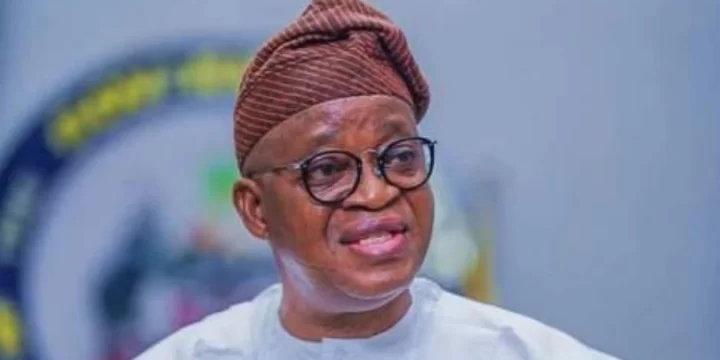The Minister of Marine and Blue Economy, Adegboyega Oyetola, has reiterated the Federal Government’s commitment to ensuring safety, security, and sustainable development within Nigeria’s maritime domain. Speaking during a stakeholders’ engagement session in Lagos on Thursday, Oyetola emphasized that a secure maritime environment is critical to the nation’s economic growth, trade facilitation, and blue economy expansion.
According to the Minister, the maritime sector holds immense potential for diversifying Nigeria’s revenue base beyond crude oil. However, he noted that the benefits can only be fully realized through enhanced safety standards, stronger enforcement mechanisms, and the adoption of technology-driven security measures. “Safety on our waters is non-negotiable,” Oyetola stated. “We are putting in place measures that will not only safeguard our maritime assets but also guarantee the confidence of both local and international investors in Nigeria’s blue economy.”

He revealed that the ministry, in collaboration with key agencies such as the Nigerian Maritime Administration and Safety Agency (NIMASA), the Nigerian Ports Authority (NPA), and the Nigerian Navy, is implementing an integrated maritime safety framework. This framework includes vessel monitoring systems, modern navigation aids, and enhanced coastal surveillance to detect and deter illegal activities such as piracy, smuggling, and oil theft.
Oyetola also noted that the Deep Blue Project, an initiative designed to enhance maritime domain awareness, is yielding results in curbing sea crimes within Nigeria’s territorial waters and the Gulf of Guinea. He added that through improved coordination between agencies and the use of technology, incidents of piracy have significantly declined in recent months. “Our waters are now safer than they were a few years ago, and this progress must be sustained through vigilance and investment,” he said.
The Minister explained that the government is equally focused on ensuring compliance with international maritime safety standards. He said efforts are ongoing to align Nigeria’s shipping and port operations with International Maritime Organization (IMO) conventions, which will help attract more shipping traffic and foreign investment. “Nigeria must not only meet but exceed international expectations in safety and operational standards. This is the path to achieving a truly competitive and sustainable maritime economy,” Oyetola affirmed.
Highlighting the importance of capacity development, Oyetola disclosed that the ministry is investing in training seafarers and port personnel to enhance their competence in safety management and emergency response. “Human capital is at the heart of maritime growth. Our people must be adequately trained to meet global standards. We are therefore strengthening partnerships with local and international institutions to equip our workforce with modern skills,” he said.
He further revealed that the government is working on improving infrastructure in major seaports, including the rehabilitation of navigation channels, installation of modern signaling systems, and procurement of new search-and-rescue equipment. These upgrades, he said, are necessary to support Nigeria’s ambition of becoming a regional maritime hub.
Oyetola also addressed the issue of marine pollution and environmental degradation, stressing that sustainability remains a key pillar of the blue economy strategy. He announced that the ministry is stepping up enforcement against illegal dumping and oil spillage while encouraging ship operators to comply with eco-friendly practices. “We cannot talk about a viable blue economy without protecting our marine ecosystems. Sustainability is the foundation of everything we are doing,” he noted.
In his remarks, the Director-General of NIMASA, Dr. Dayo Mobereola, commended the Minister’s leadership and reaffirmed the agency’s commitment to enforcing safety and security regulations across the maritime value chain. He stated that NIMASA has been intensifying port state control inspections, improving safety audits, and collaborating with the navy to secure shipping routes.
Mobereola also revealed that the agency plans to expand its search-and-rescue operations and invest in new patrol vessels to strengthen coastal surveillance. “Safety at sea remains our top priority. We are determined to ensure that vessels navigating Nigerian waters comply fully with international safety codes,” he said.
Representatives of the Shipowners Association of Nigeria (SOAN) and other industry stakeholders present at the event lauded the government’s renewed commitment to maritime safety but urged for more practical steps to tackle lingering challenges such as inadequate infrastructure, bureaucratic bottlenecks, and high operational costs.
SOAN President, Margaret Orakwusi, emphasized that private sector participation is crucial to sustaining maritime growth. “Safety cannot be achieved by government alone. Shipowners and port operators must also invest in modern safety equipment and adhere to global best practices,” she stated.
Industry experts have described Oyetola’s renewed focus on maritime safety as timely, especially as Nigeria seeks to maximize opportunities within the emerging blue economy sector. With growing global interest in marine resources, they noted that ensuring safe and secure waters would position Nigeria as a preferred investment destination and a key player in regional maritime trade.
As the country continues to diversify its economy, Oyetola reaffirmed that the Marine and Blue Economy Ministry will remain steadfast in its mission to secure Nigeria’s waters, promote sustainable use of marine resources, and strengthen economic resilience through effective maritime governance.
“Our vision is clear — a safe, secure, and prosperous maritime domain where commerce thrives, jobs are created, and the environment is protected,” Oyetola concluded.
Support InfoStride News' Credible Journalism: Only credible journalism can guarantee a fair, accountable and transparent society, including democracy and government. It involves a lot of efforts and money. We need your support. Click here to Donate
